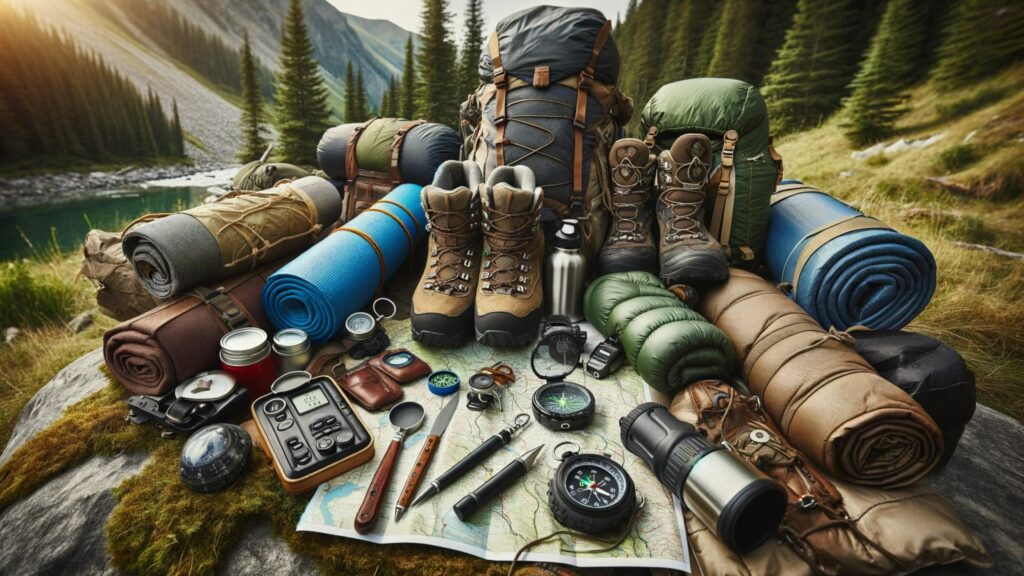Proper gear is crucial for any wilderness adventure. In this ‘Wilderness Wanderers’ section, we list the essential items every wilderness wanderer should have, including reliable backpacks, appropriate clothing, navigation tools, and camping equipment. We discuss the importance of quality gear tailored to the specific environment you’ll be exploring, ensuring durability and functionality.
Tips for Safe and Responsible Trekking
Safety and responsibility are paramount in the wilderness. Here, we provide practical hiking tips covering trail safety, weather preparedness, and wildlife encounters. We emphasize the importance of respecting nature, leaving no trace, and being aware of your surroundings. Additionally, we discuss how to minimize your environmental impact while enjoying the beauty of the outdoors.
Navigating and Survival Skills in the Wild
Navigating the wilderness and having basic survival skills are essential for any trekker or camper. This section covers essential skills such as map reading, using a compass, and understanding natural landmarks. We also delve into basic survival techniques, including finding water, building a shelter, and signaling for help in emergencies.

Food and Water Essentials for Outdoor Excursions
Managing food and water is a critical aspect of any outdoor excursion. This part of the article provides advice on planning and packing nutritious, energy-sustaining foods, and ensuring adequate water supply. We discuss various water purification methods and share tips on cooking and storing food safely in the wild.
Choosing the Right Footwear for Trekking
Footwear is a critical component of your trekking gear. This section focuses on how to choose the right footwear for different types of terrain, from rugged mountain trails to gentler forest paths. We cover the importance of selecting waterproof, durable, and comfortable hiking boots or shoes, and offer tips on proper fit and breaking them in before your trip.
Packing Smart: Lightweight and Efficient
Efficient packing can make a significant difference in your trekking and camping experience. Here, we provide guidance on how to pack smartly, ensuring you carry all essentials without overburdening yourself. We emphasize the importance of lightweight and multi-purpose gear, proper distribution of weight in your backpack, and using compression sacks and organizers for efficient packing.
Camp Setup and Etiquette
Setting up camp in the wilderness requires knowledge and respect for the environment. This part of the article covers the basics of choosing a campsite, setting up tents, and maintaining cleanliness and safety. We also discuss camping etiquette, including noise levels, respecting other campers’ space, and leaving the site as you found it.
Weather Preparedness and Coping Strategies
Weather in the wilderness can be unpredictable and challenging. In this section, we address how to prepare for various weather conditions and provide coping strategies. Tips include understanding weather patterns, packing appropriate clothing and gear for different climates, and setting up camp to withstand adverse weather.
Conclusion
“Wilderness Wanderers: Essential Gear and Tips for Trekking and Camping” equips you with the knowledge and tools for a memorable and safe wilderness experience. By preparing properly, respecting nature, and arming yourself with essential survival skills, you can confidently explore the beauty and challenges of the great outdoors. Embrace the adventure that awaits in the wilderness, where every trail leads to discovery and every night under the stars deepens your connection with nature. Remember, the wilderness is not just a place to visit; it’s an experience to be lived and cherished.
FAQs: Answering Your Wilderness Trekking and Camping Queries
What are the top items to pack for a trekking and camping trip?
Key items include a sturdy backpack, a reliable tent, a sleeping bag appropriate for the climate, a water purification system, a first-aid kit, and a multi-tool or knife.
How can I ensure I’m choosing the right gear for my adventure?
Research the specific needs of your destination, read reviews, and consider factors like climate, terrain, and the length of your trip when selecting gear.
What are some eco-friendly camping practices?
Use biodegradable products, avoid single-use plastics, respect wildlife and natural habitats, and ensure all waste is properly disposed of or packed out.
How can I stay safe while trekking in unfamiliar terrain?
Always inform someone of your itinerary, carry a map and compass (and know how to use them), monitor weather conditions, and never underestimate the terrain.
What basic survival skills should I know before heading into the wilderness?
Basic survival skills include building a shelter, starting a fire, finding and purifying water, signaling for help, and basic first aid.

